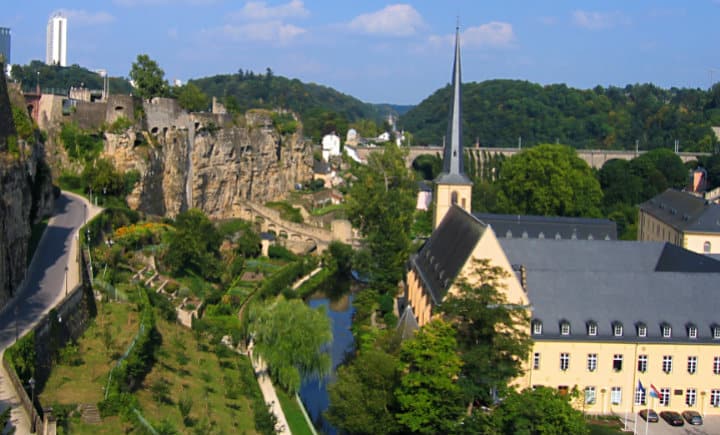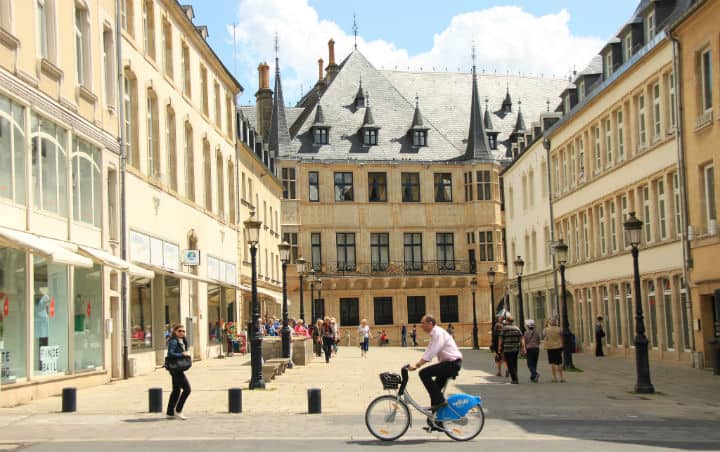
Gay Luxembourg · City Guide
First time in Luxembourg? Then our gay Luxembourg travel guide page can help you get from A to Z.
Book A Travel Gay Approved Hotel
 The Casemates of Luxembourg
The Casemates of Luxembourg
Luxembourg | Lëtzebuerg
A landlocked country in the heart of Western Europe. Luxembourg is one of the least populated countries in Europe with a population of over 500,000 people. About a fifth of the population lives within its capital, Luxembourg City.
The Luxembourg that we know today first came about in 963 when Count Siegfriend I acquired ancient roman fortifications on top of a cliff top. The House of Luxembourg produced 4 Holy Roman Empires and was even part of Napoleon's Empire. Its neutrality was violated in both World Wars by invading German military.
Nowadays, Luxembourg City is one of the three official capitals of the European Union and is home to the European Court of Justice, amongst other departments. It is known as a financial hub and great investment was made into turning the nation into a knowledge hub. Tourists are attracted to the capital's culture and its wonderful scenery.
Gay Rights in Luxembourg
In 2013, the people of Luxembourg elected the openly gay Xavier Bettel as Prime Minister. Luxembourg is a tolerant country with same-sex activity legal since 1974. Marriage and adoption rights were cemented in law in 2015 and wide-ranging legal protections are in place to prevent discrimination.
Public attitudes towards homosexuality tend to be favourable and Eurobarometer surveys place public opinion comfortably above the European average. Outside of Luxembourg City, you will not find any official or organised gay scene but those who travel outside the city shouldn't experience any problems.
Gay Scene
Luxembourg's gay scene is concentrated in the capital. Despite its small size, there are a handful of Gay Bars, Dance Clubs and Parties that cater for gay customers. Unlike other capital cities, Luxembourg City does not have a specific gay area, but gay visitors are welcome in pretty much all bars in the city.
In early July, there is an annual Pride festival that attracts visitors from all around the country and abroad. Organised by the Rosa Lëtzebuerg organisation, it is common to see local celebrities and politicians taking part in the parade.
Getting to Luxembourg
By plane
Luxembourg Airport (LUX) is the country's only international airport and is located 6km away from Luxembourg City. It is well connected to destinations in Europe and North Africa and is the hub for flag carrier Luxair.
Buses 16 and 29 run from the airport to Luxembourg City's central station. Services run from around 5 until midnight around every 10 minutes during the day (20-30 minutes at weekend) and take around 25 minutes. Short journey tickets cost €2 and can be bought from a ticket dispenser in front of the terminal.
Taxis can be hailed from in front of the terminal and will take you to the central station in around 10-15 minutes. During the day these should cost around €20-25, depending on traffic but be aware that there is a night and Sunday supplement that adds extra costs. It is possible to reserve taxis in advance to save costs and avoid queing.
By train
Luxembourg Railway Station is the busiest train station in Luxembourg and is the heart of the national rail network. It offers direct connections to neighbouring France, Belgium, Switzerland and Germany which offer further connections to the greater European rail network.
Getting around Luxembourg
By public transport
Local trains and buses take you throughout the country for an inexpensive price. Single journeys of up to 2 hours start at €2 with day tickets for the whole network costing €4. Even small villages are well connected, with most villages having at least one hourly service. Saturdays are counted as a working day but Sunday services are common. Most public transport within Luxembourg is free.
Other than walking, buses are the best way to get around Luxembourg City itself. All bus lines in the city pass through the central bus station, with a limited night bus service available.
By car
Cars can be hired at the airport, with all of the major companies present. Driving is a good way to explore the countryside and villages at your own pace while also offering amazing scenery. To rent a car, you must be over 23 (under 25's may incur a surcharge) and have held your licence for at least a year.
There are plenty of taxi ranks throughout Luxembourg City and it is worth taking note of where these are (hailing from the street can be difficult). It can sometimes be better to order in advance but be aware that there is a 10% surcharge between 10pm and 6am and a 25% increase on Sundays and bank holidays.

Where to Stay in Luxembourg
Luxembourg city has a wide choice of hotels to suit all budgets. Visit the Luxembourg Hotels page for the latest hotel deals.
Things to See & Do
in Luxembourg City
The Casemates Bock - The place where the first castle of Luxembourg stood. These 18th Century fortifications and the surrounding area are a UNESCO World Heritage Site.
The Old Town - the pedestrianised historic heart of Luxembourg. Here you will find a wide selection of shops, restaurants and bars but prices can be high.
World War II Luxembourg American Cemetery and Memorial - situated to the east of the city, this is the final resting place of over 5000, American military personal lost during World War 2. This is the final resting place of the legendary General George Patton.
MUDAM - designed by I.M. Pei (the guy who designed the pyramid at the Louvre), this is a fantastic modern art museum. In low season, the museum gets quite empty so you can appreciate art works by Marina Abramovic and Wolfgang Tillmans in tranquility.
outside Luxembourg City
Echternach - Luxembourg's oldest town and close to the German border. The monestary founded in 698 is the main attraction of the town but it's also great fun exploring the winding streets and eating and drinking in its many bars and restaurants.
Vianden - a fairy tale village that seems like it was made for photo opportunities. The main attraction is the castle perched on the hill top which offers a diverse program of events in the summer. The author Victor Hugo also spent some time here so there is a small museum dedicated to him.
When to Visit
Winters are cold and summers are hot with extremes of -15°C, and temperatures well above 30°C are not unheard of. Many tourists from neighbouring countries swarm the nation during the summer months, and Luxembourg City can become very busy. Spring and early fall are pleasant and not too busy.
Various festivals and events take place all year round in Luxembourg. The bonfires of Buergbrennen takes place on the first Sunday of Lent to celebrate the end of winter and the beginning of spring, while the dancing procession of Echternach, held on Whit Tuesday, sees many people dance through the town. The month of October is known for wine festivals.
Visa
Luxembourg is within the European Schengen visa area. If travelling from outside Europe, check to see if you require a Schengen visa.
Money
Luxembourg is a member of the Eurozone. Cash dispensers are widely available and major cards are accepted most places. It's always handy to have some cash as smaller venues may not take card.
Other Useful Information
Luxembourg is a trilingual country, with the language dependent on context. Luxembourgish is the national language and is used in broadcast media. German is the language of schools, the press and the church.
French is the most widespread language and is used by the government; however, English is widely spoken in tourist areas.
Join the Travel Gay Newsletter
Have we got something wrong?
Are we missing a new venue or has a business closed? Or has something changed and we have not yet updated our pages? Please use this form to let us know. We really appreciate your feedback.